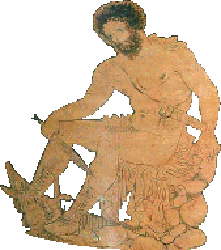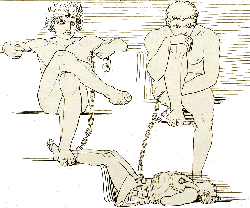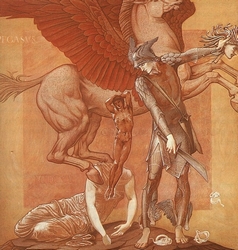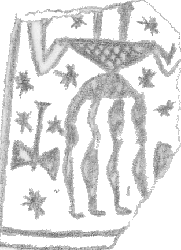TWINS IN ANCIENT GREEK MYTH
And he begat five pairs of twin sons and reared them up; and when he had divided all the island of Atlantis into ten portions, he assigned to the first-born of the eldest sons [Crit. 113e].

During Odysseus' visit to the underworld, he encounters a host of notable female figures, the wives, mothers and daughters of heroes from previous generations. One particularly surprising characteristic of this roll call, as noted by Douglas Frame, is the high frequency of multiple births - particularly twins - associated with these women. Among them are two sets of twins - Neleus and Pelias; Otus and Ephialtes - reputedly fathered by Poseidon.
In addition, Frame notes that Nestor is a "functional twin" of his deceased brother Periclymenus, with Frame regarding Chromius (as well as the numerous other even more nebulous sons of Neleus) being ciphers. Neleus is especially interesting in the light of Plato's status as a descendent of Codrus, the last king of Athens, who was himself a scion of Neleus' family.
THE ALOIDAI
Of Otus and Ephialtes, known collectively as the Aloidai or Aloedae, their impertinence became proverbial. The Odyssey [11.315-316] further alleges that, having imprisoned Ares, the perennially-ineffectual god of war: -

The Collins Dictionary of Classical Mythology adds that: "Otus and Ephialtes were threatening to keep moving mountains until they made the sea into land and the land into sea." In terms of stature, "[t]hey were fifteen feet wide, and fifty feet high at nine years old, and threatened to sound the battle-cry of savage war even against the Olympian gods" [11.311-314], and are second only to another son of Poseidon, Orion [11.309-310], in grandeur.
Of potential relevance to the Aloedae are another group of Poseidon's children: Diodorus Siculus records a Rhodian account of gigantic children sired on the island by the god who became known as "Eastern Demons" on account of iniquities committed during their youths which led to their downfall [5.55.4-7].
AEOLUS AND BOEOTUS
Platonic scholar Slobodan Dušanić identifies Poseidon's twin sons Aeolus and Boeotus as a key prototype for the Atlantean royal family, finding a number of connections between the names of the elder twins and Boeotia (Boeotus' homeland), with the younger twins corresponding to Thessalian (i.e. Aeolian) figures.
One of these twins' ancestresses, Melanippe (some sources name her as their mother; alternatively this is Arne), is identified as the model for the Atlantean matriarch Leucippe.
Aeolus and Boeotus were - according to a lost tragedies of Euripides entitled Melanippe Desmotis ("Captive Melanippe") and Melanippe Sophe ("Melanippe the Wise") - left to the elements after birth, but were adopted by the king Metapontus, whose jealous wife Theano incited her own two sons to kill the interlopers, who were favoured by Metapontus. Aided by their father Poseidon, Aeolus and Boeotus bested the two brothers in a fight and killed them, whereupon Theano committed suicide.
Aeolus and Boeotus were eventually taken in once more by Metapontus, who had now married none other than Melanippe. Boeotus would eventually succeed the elder Aeolus as king of the area around Phthia, whilst Aeolus his brother emigrated to the Aeolian (Lipari) islands north of Sicily.
Some authorities identify this Aeolus with the keeper of the winds encountered by Odysseus. Melanippe is often given as the daughter of Aeolus by Hippe ("horse"), a daughter of the noble centaur Chiron.
CHRYSAOR AND PEGASUS

Poseidon was also the father of Chrysaor and the winged horse Pegasus by the monstrous Medusa: upon her slaying by Perseus, both of these entities sprang from her neck.
Both Chrysaor and Pegasus have echoes in the story of Atlantis. In the case of the former, he came to be identified with the far west, siring Geryon, who dwelt on Erytheia, the island of sunset, whilst Pegasus' dual nature is echoed in the Critias, where the statue of Poseidon in his temple is depicted on a chariot drawn by "six winged steeds" [116de].
According to Hesiod's Theogony, Pegasus was named due to the pair's being born by the springs [pegai] of ocean [280-282]. Springs also feature in the story of Atlantis, with the central island, wherein Poseidon housed his lover Cleito, possessing two, one bearing hot water and the other cold [Crit. 113e, 117a].
Springs, of course, cannot be a definitive argument in favour of an identification, as clean water is a prerequisite for life. Nevertheless, given that Herodotus calls the sea in which Atlantis was located by Plato by the name "Atlantis," it is perhaps not beyond the bounds of possibility that Plato is drawing on earlier stories of the springs of ocean in developing his scenario.
LYCUS AND NYCTIMUS
Poseidon also had a number of children by daughters of Atlas. Among these, Lycus was named by Hellanicus of Lesbos as possessing the Μακάρων Νήσοι. Lycus is ascribed a brother Nyctimus and the pair may have originally been twins: the signification of their names suggest light and darkness.
Another Lycus and Nycteus are possibly sons of Hyrieus, a son of Poseidon by another Atlantid, Alcyone.
Comparable are Lycaon and his son Nyctimus. According to the Encyclopedia Britannica: "Usener and others identify Lycaon with Zeus Lycaeus, the god of light, who slays his son Nyctimus (the dark) or is succeeded by him, in allusion to the perpetual succession of night and day."
Alcyone also bore Poseidon Hyperenor and Anthas, founders of Hypereia and Anthea, two settlements which were later united by Pittheus to found Troezen.
THE MOLIONES

Poseidon is also said to have been the true father of Eurytus and Cteatus, the Moliones or Actorides, Epeian enemies of Nestor mentioned retrospectively in the Iliad.
Therein, they once defeated the then young and impetuous Pylian in a chariot race [23.638-640], but were bested by him during a war between Pylos and Elis [11.709-710], narrowly escaping with their lives due to the intervention of the god.
The Moliones are especially noteworthy as having once inflicted a rare defeat on Heracles, who eventually had his revenge, proving to be their doom [Pindar, Olympian 10.30-34; Pseudo-Apollodorus 2.7.2].
Idas, who with his brother Lynceus served as Argonauts but later tragically came to blows with their former comrades Castor and Polydeuces, was said in some sources to be a son of Poseidon too. Though not explicitly twins, the pair are generally mentioned together.
